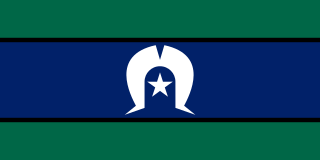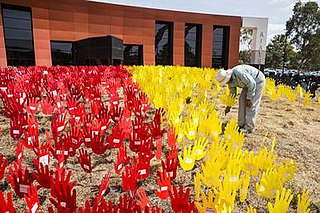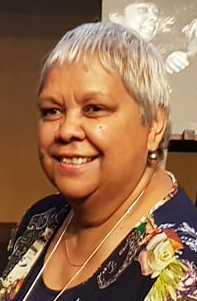
The Torres Strait Islands are a group of at least 274 small islands in the Torres Strait, a waterway separating far northern continental Australia's Cape York Peninsula and the island of New Guinea. They span an area of 48,000 km2 (19,000 sq mi), but their total land area is 566 km2 (219 sq mi).

The Aboriginal and Torres Strait Islander Commission (ATSIC) (1990–2005) was the Australian Government body through which Aboriginal Australians and Torres Strait Islanders were formally involved in the processes of government affecting their lives, established under the Hawke government in 1990. A number of Indigenous programs and organisations fell under the overall umbrella of ATSIC.

Lowitja Lois O'Donoghue Smart, is an Aboriginal Australian retired public administrator. In 1990-1996 she was the inaugural chairperson of the Aboriginal and Torres Strait Islander Commission (ATSIC). She is patron of the Lowitja Institute, a research institute for Aboriginal & Torres Strait Islander health and wellbeing.
The Office of Indigenous Policy Coordination (OIPC) was the Australian Government-led unit for the coordination of policy, programs and services for Indigenous Australians from July 2004 to August 2011.

The Australian Institute of Aboriginal and Torres Strait Islander Studies (AIATSIS), established as the Australian Institute of Aboriginal Studies (AIAS) in 1964, is an independent Australian Government statutory authority. It is a collecting, publishing and research institute and is considered to be Australia's premier resource for information about the cultures and societies of Aboriginal and Torres Strait Islander peoples. The institute is a leader in ethical research and the handling of culturally sensitive material and holds in its collections many unique and irreplaceable items of cultural, historical and spiritual significance. The collection at AIATSIS has been built through over 50 years of research and engagement with Aboriginal and Torres Strait Islander communities and is now a source of language and culture revitalisation, native title research and family and community history. AIATSIS is located on Acton Peninsula in Canberra, Australian Capital Territory.
Aboriginal and Torres Strait Islander Services was part of the now disbanded Aboriginal and Torres Strait Islander Commission (ATSIC).
The Office of Aboriginal and Torres Strait Islander Health, often known by its acronym OATSIH, was a division of the Australian Government's Department of Health and Ageing. It was set up in 1994 in the then Department of Human Services and Health to give a greater focus on the health needs of Indigenous Australians in mainstream health programs.
Geoff Clark is an Australian Aboriginal politician and activist. Clark led the Aboriginal and Torres Strait Islander Commission (ATSIC) from 1999 until it was effectively disbanded in 2004.
Indigenous Australian self-determination, also known as Aboriginal Australian self-determination, is the power relating to self-governance by Aboriginal and Torres Strait Islander peoples in Australia. It is the right of Aboriginal and Torres Strait Islander peoples to determine their own political status and pursue their own economic, social and cultural interests. Self-determination asserts that Aboriginal and Torres Strait Islander peoples should direct and implement Aboriginal and Torres Strait Islander policy formulation and provision of services. Self-determination encompasses both Aboriginal land rights and self-governance, and may also be supported by a treaty between a government and an Indigenous group in Australia.

Tania Major is an Aboriginal activist who first came to prominence in 2004 as the youngest person elected to the Aboriginal and Torres Strait Islander Commission (ATSIC).

The Aboriginal Shire of Palm Island is a special local government area of Queensland, Australia, managed by the Palm Island Aboriginal Shire Council under a Deed of Grant in Trust granted to the community on 27 October 1986. The local council was previously the Palm Island Community Council, which had far fewer powers. The shire is located on the Palm Island group, off the north Queensland coast near the city of Townsville.
Sue Gordon is an Aboriginal retired magistrate from Western Australia who has been locally and nationally honoured for her work with Aboriginal people and in community affairs. She is known for being chair of the Gordon Inquiry in 2002.
The National Indigenous Council (NIC) was an appointed advisory body to the Australian Government through the Minister's for Indigenous Affairs' Taskforce on Indigenous Affairs (MTIA) established in November 2004, and wound up in early 2008. It was chaired by Sue Gordon, a Western Australian magistrate.
Indigenous Australians are people with familial heritage from, and membership in, the ethnic groups that lived in areas within the Australian continent before British colonisation. They consist of two distinct groups: the Aboriginal peoples of the Australian mainland and Tasmania, and the Torres Strait Islander peoples from the seas between Queensland and Papua New Guinea. The term Aboriginal and Torres Strait Islander peoples or the person's specific cultural group, is often preferred, though the terms First Nations of Australia, First Peoples of Australia and First Australians are also increasingly common; 812,728 people self-identified as being of Aboriginal and/or Torres Strait Islander origin in the 2021 Australian Census, representing 3.2% of the total population of Australia. Of these Indigenous Australians, 91.4% identified as Aboriginal; 4.2% identified as Torres Strait Islander; while 4.4% identified with both groups. Since 1995, the Australian Aboriginal flag and the Torres Strait Islander flag have been official flags of Australia.

Jacqueline Gail "Jackie" Huggins is an Aboriginal Australian author, historian, academic and advocate for the rights of Indigenous Australians. She is a Bidjara/Pitjara, Birri Gubba and Juru woman from Queensland.

The Aboriginal and Torres Strait Islander Heritage Protection Act 1984(Cth), is an Act passed by the Parliament of the Commonwealth of Australia to enable the Commonwealth Government to intervene and, where necessary, preserve and protect areas and objects of particular significance to Australia's Aboriginal or Torres Strait Islander peoples from being desecrated or injured.
The Department of Social Security was a government department in Australia, which administered the Social Security system between 1972 and 1998. The department was one of several new departments established by the Whitlam government and was managed by the Minister for Social Security.
Solomon David Bellear was an Aboriginal Australian public figure.
The Aboriginal and Torres Strait Islander Voice, also known as the Indigenous Voice to Parliament or the Voice, is a proposed Australian federal advisory body comprising Aboriginal and Torres Strait Islander people to represent the views of Indigenous communities. If approved in an upcoming referendum called by the Albanese Government, the Voice would be empowered by the Australian Constitution to make representations to the Parliament of Australia and executive government on matters relating to Indigenous Australians. If the referendum vote is successful, the government will then design the specific form of the Voice, which will then be implemented via legislation passed by Parliament.
Constitutional recognition of Indigenous Australians has been campaigned for since 1910, including having an Indigenous voice to parliament enshrined in the Constitution of Australia.







